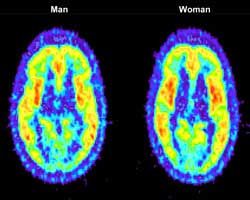 |
Interesting Medical Breakthrough
 BRIDGING THE GENDER GAP
Ľ Thanks to improved imaging
techniques and testing methods, the biological evidence of gender
differences in human brains is emerging rapidly. Now researchers are
able to compare what happens within menís and womenís heads as they
listen, think, remember, and talk. Here are a few of their findings. BRIDGING THE GENDER GAP
Ľ Thanks to improved imaging
techniques and testing methods, the biological evidence of gender
differences in human brains is emerging rapidly. Now researchers are
able to compare what happens within menís and womenís heads as they
listen, think, remember, and talk. Here are a few of their findings.
-
Men have fewer nerve cel in the left half of the brain, the seat of
the ability to process language than women. This is significant
because, in the brain, quantity of cells often correlates with
quality. In a gymnastís brain, for example, the balance and motor
skills region is larger than in a nongymnastís and the more the
gymnast practices, the bigger it gets.
-
Women have a greater degree of connectivity between the two halves
of the brain , and the network of fibres that connect their right
and left brains (the corpus callosum) is larger. This may explain an
unusual difference, the significance of which scientists donít yet
fully understand: the sexes prosess single words similarly, but when
interpreting sentence, men use a single specific area on one side of
the brain; women mobilize the same area, but in the right and left
parts of the brain.
-
Women appear to use more of their brains to listen and speak. That
doesnít make women better listeners or speakers, but the increased
accessibility they have to some parts of their brains may make
activities essential to communication easier for them.
-
Following a distressing event, men tend to experience stress less
intensely than women do. Researchers attribute this anomaly to the
presence of estrogen, which activates a larger field of neurons in
women during an upsetting experience.
-
Women are better at tasks that require memorization because their
higher level of estrogen is associated with improved learning and
memory.
-
Men can sometimes better identify straightforward emotions such as
rage and aggression in othersí facial expressions and tone of voice
than women can. This may be a holdover from the days when men had to
assess aggression in other males so they could speedily arrange a
defense. But men donít score as high as women in picking up on
subtle nonverbal cues that telegraph sadness or fear. One of the
most encouraging discoveries thus far is that the gender gap in
brain function narrows as couples age. Researchers speculate this
improvement in compatibility may occur because of the time spent
with each other, learning from one another and in so doing become
more alike.
|

